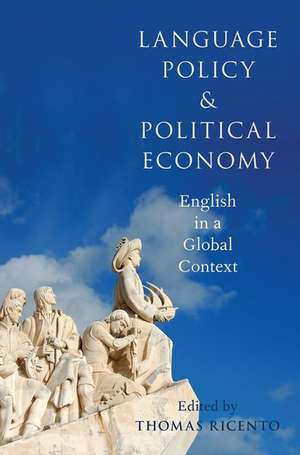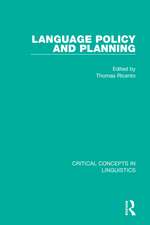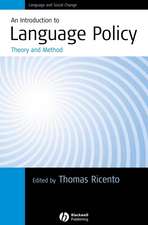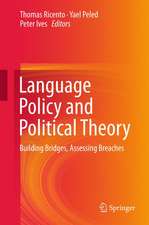Language Policy and Political Economy: English in a Global Context
Editat de Thomas Ricentoen Limba Engleză Paperback – 8 dec 2016
| Toate formatele și edițiile | Preț | Express |
|---|---|---|
| Paperback (1) | 244.86 lei 31-37 zile | |
| Oxford University Press – 8 dec 2016 | 244.86 lei 31-37 zile | |
| Hardback (1) | 570.02 lei 31-37 zile | +116.30 lei 4-10 zile |
| Oxford University Press – 19 feb 2015 | 570.02 lei 31-37 zile | +116.30 lei 4-10 zile |
Preț: 244.86 lei
Preț vechi: 276.49 lei
-11% Nou
Puncte Express: 367
Preț estimativ în valută:
46.85€ • 49.04$ • 38.100£
46.85€ • 49.04$ • 38.100£
Carte tipărită la comandă
Livrare economică 20-26 martie
Preluare comenzi: 021 569.72.76
Specificații
ISBN-13: 9780190656737
ISBN-10: 0190656735
Pagini: 336
Dimensiuni: 231 x 155 x 25 mm
Greutate: 0.5 kg
Editura: Oxford University Press
Colecția OUP USA
Locul publicării:New York, United States
ISBN-10: 0190656735
Pagini: 336
Dimensiuni: 231 x 155 x 25 mm
Greutate: 0.5 kg
Editura: Oxford University Press
Colecția OUP USA
Locul publicării:New York, United States
Recenzii
Language Policy and Political Economy is a high-quality and high-powered collection. Ricento has curated a volume that provides an interdisciplinary perspective on English in the contemporary world. With their focus on capitalism, development, globalization, and neoliberalism, the contributions are decidedly relevant for understanding today's language politics. In all, the book provides the field of language policy and planning with a robust introduction to the foundations of political economy.
Tom Ricento and the stellar cast of scholars he has assembled in this book achieve something extraordinary: they construct a story that people will still have to read decades later, on an object characterized paradoxically by extremely rapid and radical change. It is an intellectual and academic 'tour de force' which focuses on mechanisms and structures rather than on phenomena and anecdotes, and so easily transcends the level of here-and-now documentation.
In an era where language change and loss is often explained by reference to inevitable forces of 'culture' and 'globalization,' this important book brings us back home to core questions of economic power and political control.
Language Policy and Political Economy is both timely and important, engaging with the debates that are central to current language policy research. I don't think anyone will be able to write about 'global English' again without seriously engaging with the analyses in this book.
The editor and contributors are to be congratulated for forging a new approach to language policy and the role of English in the world. They also rightly question the widely shared view that the global spread of English is overwhelmingly positive.
Language Policy and Political Economy is superbly conceived and executed, rewarding readers as both a coherent collective and in individual essays. It was an utmost pleasure to read... Each of the authors needs to be commended for taking the stances they have and for speaking in unison about political economy and global English. Ricento is to be commended for bringing together ideas that are fundamental to who we are as humans and to what our ideals of equality ought to look like. Quite simply, this volume was a treat to review.
The book contributes to the demythologisation of an 'English-only' remedy for the world's communication problems. It offers perspectives from linguistic economy, political theory, sociology, English, and education studies, and presents a broad range of research methods.
Ricento's book convinces the reader of the importance of the political economy perspective when analysing language policy in general
Language Policy and Political Economy is superbly conceived and executed, rewarding readers as both a coherent collective and in individual essays.
Tom Ricento and the stellar cast of scholars he has assembled in this book achieve something extraordinary: they construct a story that people will still have to read decades later, on an object characterized paradoxically by extremely rapid and radical change. It is an intellectual and academic 'tour de force' which focuses on mechanisms and structures rather than on phenomena and anecdotes, and so easily transcends the level of here-and-now documentation.
In an era where language change and loss is often explained by reference to inevitable forces of 'culture' and 'globalization,' this important book brings us back home to core questions of economic power and political control.
Language Policy and Political Economy is both timely and important, engaging with the debates that are central to current language policy research. I don't think anyone will be able to write about 'global English' again without seriously engaging with the analyses in this book.
The editor and contributors are to be congratulated for forging a new approach to language policy and the role of English in the world. They also rightly question the widely shared view that the global spread of English is overwhelmingly positive.
Language Policy and Political Economy is superbly conceived and executed, rewarding readers as both a coherent collective and in individual essays. It was an utmost pleasure to read... Each of the authors needs to be commended for taking the stances they have and for speaking in unison about political economy and global English. Ricento is to be commended for bringing together ideas that are fundamental to who we are as humans and to what our ideals of equality ought to look like. Quite simply, this volume was a treat to review.
The book contributes to the demythologisation of an 'English-only' remedy for the world's communication problems. It offers perspectives from linguistic economy, political theory, sociology, English, and education studies, and presents a broad range of research methods.
Ricento's book convinces the reader of the importance of the political economy perspective when analysing language policy in general
Language Policy and Political Economy is superbly conceived and executed, rewarding readers as both a coherent collective and in individual essays.
Notă biografică
Thomas Ricento is Professor and Research Chair at the University of Calgary, Canada. He has published widely in the field of language policy and on the politics of language in North America. He was a Fulbright Professor in Colombia (1989) and Costa Rica (2000), and a visiting professor at universities in Chile, Germany, Spain, , and Switzerland. He was Director of English Language Programs at the Japan Center for Michigan Universities, Hikone, Japan from 1989-1991.













